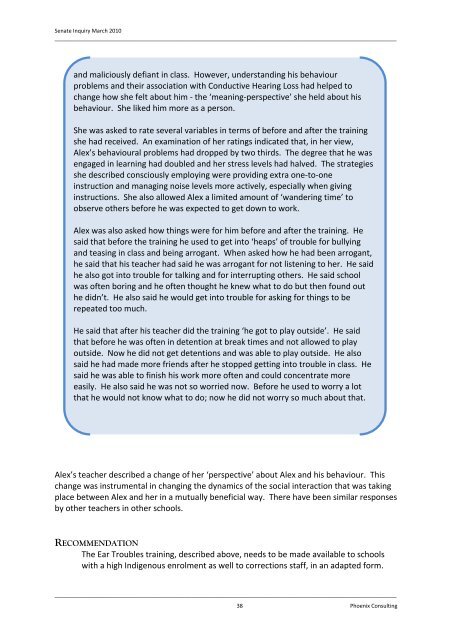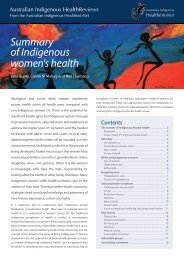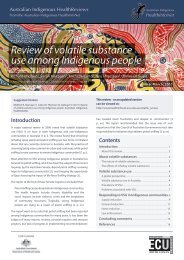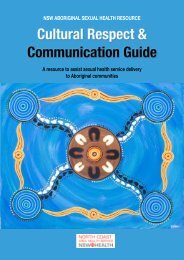Senate Inquiry March 2010_________________________________________________________________________________________________________________<strong>and</strong> maliciously defiant in class. However, underst<strong>and</strong>ing his behaviourproblems <strong>and</strong> <strong>the</strong>ir association with Conductive Hearing Loss had helped tochange how she felt about him ‐ <strong>the</strong> ‘meaning‐perspective’ she held about hisbehaviour. She liked him more as a person.She was asked to rate several variables in terms of before <strong>and</strong> after <strong>the</strong> trainingshe had received. An examination of her ratings indicated that, in her view,Alex’s behavioural problems had dropped by two thirds. The degree that he wasengaged in learning had doubled <strong>and</strong> her stress levels had halved. The strategiesshe described consciously employing were providing extra one‐to‐oneinstruction <strong>and</strong> managing noise levels more actively, especially when givinginstructions. She also allowed Alex a limited amount of ‘w<strong>and</strong>ering time’ toobserve o<strong>the</strong>rs before he was expected to get down to work.Alex was also asked how things were for him before <strong>and</strong> after <strong>the</strong> training. Hesaid that before <strong>the</strong> training he used to get into ‘heaps’ of trouble for bullying<strong>and</strong> teasing in class <strong>and</strong> being arrogant. When asked how he had been arrogant,he said that his teacher had said he was arrogant for not listening to her. He saidhe also got into trouble for talking <strong>and</strong> for interrupting o<strong>the</strong>rs. He said schoolwas often boring <strong>and</strong> he often thought he knew what to do but <strong>the</strong>n found ou<strong>the</strong> didn’t. He also said he would get into trouble for asking for things to berepeated too much.He said that after his teacher did <strong>the</strong> training ‘he got to play outside’. He saidthat before he was often in detention at break times <strong>and</strong> not allowed to playoutside. Now he did not get detentions <strong>and</strong> was able to play outside. He alsosaid he had made more friends after he stopped getting into trouble in class. Hesaid he was able to finish his work more often <strong>and</strong> could concentrate moreeasily. He also said he was not so worried now. Before he used to worry a lotthat he would not know what to do; now he did not worry so much about that.Alex’s teacher described a change of her ‘perspective’ about Alex <strong>and</strong> his behaviour. Thischange was instrumental in changing <strong>the</strong> dynamics of <strong>the</strong> social interaction that was takingplace between Alex <strong>and</strong> her in a mutually beneficial way. There have been similar responsesby o<strong>the</strong>r teachers in o<strong>the</strong>r schools.RECOMMENDATIONThe Ear Troubles training, described above, needs to be made available to schoolswith a high <strong>Indigenous</strong> enrolment as well to corrections staff, in an adapted form._________________________________________________________________________________________________________________38 Phoenix Consulting
Senate Inquiry March 2010_________________________________________________________________________________________________________________It was not only in classrooms that listening problems related to Conductive Hearing Loss <strong>and</strong>background noise were evident. Student interviews highlighted <strong>the</strong> problems that resultedfrom background noise on playgrounds. It is generally assumed that students have <strong>the</strong>opportunity to freely socialise in <strong>the</strong> playground during break times. The comments oftargeted students suggest that, for children with Conductive Hearing Loss, this is often not<strong>the</strong> case.The reality that was revealed, was one in which Conductive Hearing Loss <strong>and</strong> high levels ofbackground noise combined to restrict verbal communication opportunities on <strong>the</strong>playground, in <strong>the</strong> same way as it did in classrooms. The high levels of background noise,especially around play equipment <strong>and</strong> in group games, inhibited verbal communication formany children with Conductive Hearing Loss. Restricted verbal communicationopportunities in noisy playgrounds prompted social involvement through teasing, as it did inclassrooms. In <strong>the</strong> less teacher‐controlled playground, this was more likely to result inphysical fights.When classroom peers of children with <strong>hearing</strong> <strong>loss</strong> were asked about <strong>the</strong>ir experiences inrelation to <strong>the</strong>se children, <strong>the</strong>y spoke of being teased by <strong>the</strong> children with <strong>hearing</strong> <strong>loss</strong>,having <strong>the</strong>ir possessions taken, <strong>the</strong>ir access to classroom materials was denied <strong>and</strong> <strong>the</strong>ywere often pushed, prodded <strong>and</strong> poked. Fur<strong>the</strong>r, <strong>the</strong>ir comments in conversation wereoften ignored or misunderstood by <strong>the</strong> children with <strong>hearing</strong> <strong>loss</strong>; <strong>the</strong>y were bossed <strong>and</strong>told what <strong>the</strong>y should be doing, as well as told on to <strong>the</strong> teacher. It was not surprising that<strong>the</strong>se students with Conductive Hearing Loss were often not liked by <strong>the</strong>ir peers.Social problems in childhood are likely to result in problems in later social <strong>and</strong> psychologicaladjustment. Levine (1966) found <strong>the</strong> quality of <strong>the</strong> interpersonal relations that childrenestablish with <strong>the</strong>ir peers during <strong>the</strong>ir school years, is linked to later success outside ofschool. Fur<strong>the</strong>rmore, problems in relating to peers in childhood have been found to beassociated with psychological difficulties during adolescence (Brown, Bhrolchain & Harris,1975; Miller & Ingham, 1976; Parker & Asher, 1987).It is suggested that <strong>the</strong> single best childhood predictor of adult adaptation is <strong>the</strong> adequacywith which <strong>the</strong> child gets along with o<strong>the</strong>r children. Children who are generally disliked,who are aggressive <strong>and</strong> disruptive, who are unable to sustain close relationships with o<strong>the</strong>rchildren, or who cannot establish a place for <strong>the</strong>mselves in <strong>the</strong> peer culture, are seriously atrisk of problems in adulthood (Hartup, 1992). Children who are rejected by peers reportloneliness <strong>and</strong> social dissatisfaction (Asher & Wheeler, 1985), have more difficulties learning(Amidon <strong>and</strong> Hoffman, 1965), <strong>and</strong> are at risk of adjustment problems such as dropping outof high school, juvenile delinquency, <strong>and</strong> mental health problems in adulthood (Parker &Asher, 1987)._________________________________________________________________________________________________________________39 Phoenix Consulting








